RPEG: Strong regulation helping to protect environment
Fines totalling £105 million brought about by Environment Agency prosecutions in 2021

Image of Environment Agency employee monitoring water
Environmental regulation is helping businesses to protect the environment and tackle the climate crisis, a new report reveals today (1 November), with more work needed to reduce serious water pollution incidents.
Some 97% of industrial sites overseen by the Environment Agency are in the top compliance bands when it comes to protecting the environment, based on a five-year moving average, helping to ensure our air, land, and water is protected from harm.
The data is revealed in the EA’s Regulating for People, Environment and Growth report (RPEG) 2021, which shows improving trends in environmental compliance.
Since 2010, there has been a 72% decrease in NOx emissions, and a 90% decrease in SOx emissions, from sites the EA regulates. There has also been a 50% decrease in emissions of greenhouse gases from sites the EA regulates during the same period.
And last year, the Environment Agency’s regulation led to the closure of 561 illegal waste sites and uncovered 445 new sites. It also ensured a nine million tonne reduction of CO2 compared to 2020 through the climate change emissions trading and energy efficiency schemes it manages.
This is alongside a record 99% of bathing waters in England meeting or exceeding the minimum quality standard last year.
The report comes as Sir James Bevan, chief executive of the Environment Agency, delivered a speech on the future of regulation to the Whitehall and Industry Group today.
Sir James said:
Do we want clean water, air that’s safe to breathe, a green country, jobs and growth? Yes – and those are some of the things you get from regulation when it’s done right.
Good regulation is essential for most of the things we all want. The report we are launching today, Regulating for People, the Environment and Growth sets out what the EA does to support those things.
But no regulatory system is perfect, including ours. Brexit is a massive opportunity to rethink how we do regulation in this country. The government has embarked on that process, and we welcome the debate.
As an example of improving the regulatory system in a post-Brexit UK, he said opportunities lie in repealing the Floods Directive and reforming Water Framework Directive.
He said:
There will be examples of laws we find we don’t really need. There will be examples where changing the law will allow us to achieve better outcomes for the environment and nature and support economic growth. And there will be some laws that it will make eminent sense to keep.
The RPEG report, comprising data from regulatory activities in 2021, also reveals:
- Fines totalling £105 million were issued by the courts as a result of over 100 environmental prosecution cases brought by the EA in 2021
- Environmental groups have received £15 million over the past five years as a result of enforcement undertakings accepted by the EA
- Last year, we saw a reduction in CO2 of 9 million tonnes compared to 2020
- Since 2010, emissions of greenhouse gases from the sites we regulate under the Environmental Permitting Regulations (EPR) have decreased by 50%. Methane emissions from these sites have decreased by 51%
- Since 2017, through reviewing, changing and revoking abstraction licences, we have removed the risk of the potential abstraction of 1.7 trillion litres of water from the environment
However, the report also showed that in 2021, the environmental performance of England’s water and sewerage companies was the worst seen for years. Serious pollution incidents increased to their highest total since 2013, while monitors on storm overflows – installed at Environment Agency insistence – are highlighting that untreated sewage flows into our rivers too frequently.
Sir James has also welcomed the record £90 million fine imposed on Southern Water for widespread pollution last July; a clear signal that this is not what the EA or the public expect from companies whose job it is to treat sewage and protect the environment.
Sir James added:
Strong regulation needs strong regulators. If regulators are going to do their jobs they need the right powers, the right resources, the right laws and the right support.
Regulation doesn’t exist to protect us from ourselves. It exists to protect things we value – people, nature, our economy - that would not otherwise be protected. Let’s have no more regulation than we need, and let’s have the right kind. But when we need it, let’s make sure we have it.
The Environment Agency’s vision of promoting green growth and a sustainable future is a key strand of the EA’s five-year action plan, entitled ‘EA2025’.